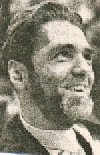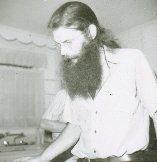|
In memory of David Thoreau Wieck and John A. Schumacher, we dedicate this journal to
the social ideals they tirelessly struggled to see realized.
David and John were loving and courageous individuals - honest, straightforward, highly ethical men who shunned personal celebrity, success and wealth, and devoted their lives to the well-being of others, and to the betterment of society at large. They are loved and missed by their families, and by countless students, friends, and colleagues. Both were social anarchists - a position they embraced not only as a philosophy, but as a daily practice. They recognized anarchism as a potent antidote to the destructive forces of patriarchy, heirarchy and capitalism. They sought, at every turn in their daily lives, to act in accordance with the profound principles on which anarchism is founded. Appreciating that social organization built on coercive relations can never be ethical, nor just, both men sought to call social hierarchy into question whenever and wherever they found it. This is no easy thing to do in a world in which the powers-that-be feel that they must, at all costs, create the illusion that coercion is legitimate in order to maintain positions of privilege founded on it. As David wrote in an article he wrote in 1966 -
If someone is looking for an exceedingly difficult line to travel, it will be a line which obliges one to notice the use of power in everyday life, the abuses of power in idealistic movements, the distortions to which freedom-movements are susceptible, the terrible situations which force one to choose a particular value over another equally dear - and yet preserve in oneself the powers, in every dubious existential moment, to devise an action creative of the good. Not only did both men eloquently critique coercive forms of social organization and strive in practice to root them out, they actively participated in constructing positive alternatives - grass-roots communities in which individuals could voluntarily come together, in a spirit of mutual aid and solidarity, to forge their own destinies. I am fortunate to have been born into an informal, loose-knit community of families and individuals who believed strongly in these things, in no small part due to the presence in that community of David Wieck, and his life-long partner, Diva Agostinelli Wieck. David was at that point teaching at R.P.I, a college in my home town. John Schumacher, his student at the time, was there, as was John Fudjack and other students of David's. They had been introduced to anarchism by Diva and David Wieck and embraced it. Thirty-four years earlier, the Spanish revolution had inspired David himself, at the tender age of 15, to adopt an anarchist approach. David, who was a pacifist, later spent nearly three years in a federal prison as a conscientious objector during WWII. After his release he became an editor and contributor to 'Why?' (later renamed 'Resistance'). It was there that he met Diva, a feminist and anarchist who was on the editorial board of the periodical. Dorothy Rogers, Emma Goldman's companion and secretary was part of that early group, as was Paul Goodman, who found the early friendship and support of Diva and David invaluable. Much later, when David took up teaching and the Wiecks settled in our area, they brought with them this larger network of folks - many of whom would, on occasion, visit our town to see David and Diva and participate in local events. Over the years, the membership of our local community changed. People came and went, grouped and regrouped - as will happen in college towns. I was at the time too young to later remember many details of these early days, and there was a period of years in which my family and I traveled elsewhere. We eventually returned, and I had the opportunity, as a teenager, to sit in on a course that was given by John Schumacher, who had by then become a seasoned and greatly admired teacher himself. A few years afterwards, when I was writing on participatory democracy, and was immersed in organizing for the restoration of democratic governance at Goddard, I was most fortunate to have had David and John to talk to and to read and criticise what I had written. When David died in 1997, John Schumacher wrote: David was fond of saying that, as an idea, anarchism is a negativity, because it can tell us what we need to unlearn in order to be free, but it cannot tell us how to use that freedom: anarchism does not impose a certain life on us, it challenges us to make a decent life together, to rid ourselves of all vestiges of the authority of power, political authority. To understand the mutual aid of our own authority of competence, David liked us to picture two sawyers, at either end of a two-person saw, cutting through a tree. For the work we need to do together, David had a special gift of description. John contributed frequently to anarchist publications, writing eloquently on the basic principles on which anarchism is founded. He also brought the view alive by applying it - with insight, skill and creativity -
In dedicating this site we want to acknowledge not only the influence that Diva and David Weick and John Schumacher have directly and indirectly made to the various ideas that can be found within these pages - we also want to acknowledge the influence they have had on the course of our lives. We would not be who we now are had it not been for their beneficial presence in our world, and that world would have been much worse off for their absence. Although David and John are no longer with us, their contribution will not be forgotten. The spirit in which they lived remains strong and healthy in the individuals they touched and in the communities they devoted themselves to. May the ideals to which they dedicated their lives be fully realized!
In solidarity,
 |


